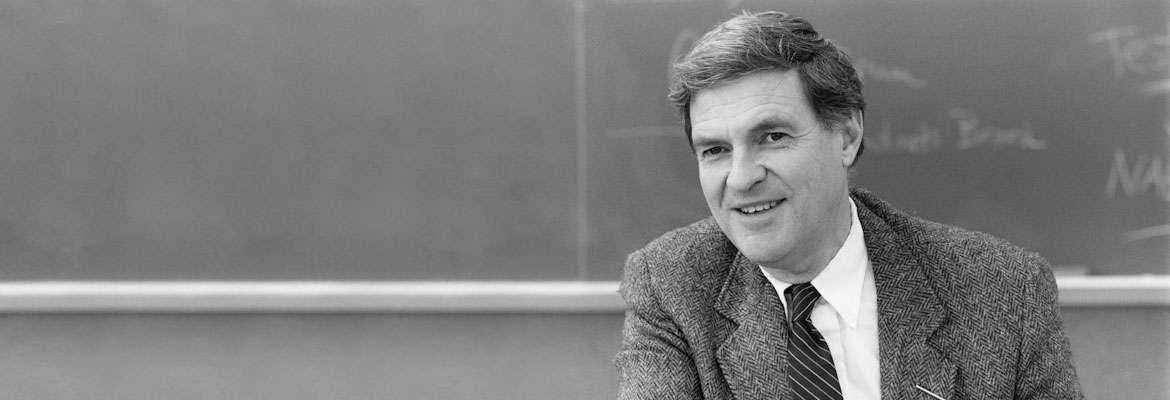On October 21, 2009, CES’s founder Ted Sizer passed away. In honor of the seventh anniversary of his death, we are republishing our October 2009 In Memoriam statement. We think about Ted every day and miss him in so many ways. We send love and peace to the Sizer family and all who knew and loved Ted.
Theodore R. Sizer, June 23, 1932-October 21, 2009: In Memoriam
With great sadness, the Coalition of Essential Schools shares the news of the passing of our founder Theodore R. Sizer on October 21, 2009. Surrounded by his family, Ted died at home in Harvard, Massachusetts, after a long, fierce battle with cancer. Ted leaves his beloved wife Nancy Faust Sizer, four children, ten grandchildren, and a wide circle of loving family and friends.
A New England native, Ted Sizer is widely recognized as a giant in the modern educational reform movement in the United States. His life and work have greatly influenced the instructional practices of schools, districts, states, and educators across the country and abroad for three decades. His eloquent and fervent championing of progressive educational ideals has had a profound effect on hundreds of thousands of educators and students.
After a career that included U.S. Army service, classroom teaching, serving as the Dean of the Harvard Graduate School of Education, and leading Phillips Academy Andover as its Headmaster, Ted Sizer came to Brown University as chair of its education department. There, in 1984, Ted founded the Coalition of Essential Schools to bring together examples of the radical school restructuring that was the focus of Horace’s Compromise, his work about the state of American high schools. Ted served as the executive director of the Coalition of Essential Schools until 1997; during that time, he also established and led the Annenberg Institute for School Reform. He retired from Brown as Professor Emeritus in 1996 and accepted an appointment as Visiting Professor at the Harvard Graduate School of Education, where he taught, along with Nancy, until very recently. Ted and Nancy helped to found the Francis W. Parker Charter Essential School where they served as trustees, and for one year as co-principals. With Nancy and other educators, Ted also co-founded the Forum for Education and Democracy, an “action-tank” designed to promote an education system for an informed and enlightened citizenry. Until his death, Ted remained an active part of many of the institutions with which he was affiliated and organizations that he founded, including CES, of which he was Chairman Emeritus.
Ted’s personal style aligned perfectly with his approach to schools. He enjoyed the company of teachers, and listened to them with exquisite care. He respected them, and envisioned schools guided by their expertise, professional collegiality, and knowledge of their students. Ted’s own interest in the individual and particular experiences of young people guided the way he—and then we—saw schools. Ted wanted to hear directly from students—what was their sense of school and their lives? What excited them? What troubled them? What were they learning? How could they demonstrate their abilities in ways that would honor their progress and accomplishments, and shine a clear light on their future paths?
Ted captured the national imagination when he compassionately, carefully, and forcefully conveyed that there was little value in “tinkering around the edges” of the institution of schooling. Instead, he believed we needed to invent, create, and re-imagine what school should be according to a set of principles. These principles, the CES Common Principles, inspire, guide, and challenge us to be bold. Ted urged us to remake schools and their systems to allow sustained and deliberate focus on every individual student, to honor the professional lives of educators, to structure schools with fundamental commitments to democracy and equity, and to teach and learn essential content with more depth and mastery. His vision of the Common Principles requires us to liberate intellectual pursuit from the bonds of “disciplines” and senseless schedules, and to assess student learning and school effectiveness based on first-hand, detailed understandings of what students know and can do. And he made it clear that the culture of a school and its academic endeavors are, quite simply, one.
The legacy of Ted’s work is affirmed every time students are able to demonstrate to their communities in deep and meaningful ways what they know and can do; every time teachers and students are given time, space, and support to make authentic meaning of the world; every time students are held, respectfully and unwaveringly, to high standards that are appropriate to them as individuals; every time a school faculty convenes to talk in serious, productive ways about students and their work; every time a school community takes seriously that it holds its own destiny in its hands and acts on that responsibility in the spirit of inquiry and democracy. These things happen in schools across this nation and around the world every day because Ted Sizer was with us as connector, persuader, critic, path-clearer, cheerleader, and guiding light.
Memories and observations about Ted Sizer’s life and work from CES colleagues are featured in “CES at 25: Changing Schools, Changing Lives,” the Fall 2009 edition of Horace.

